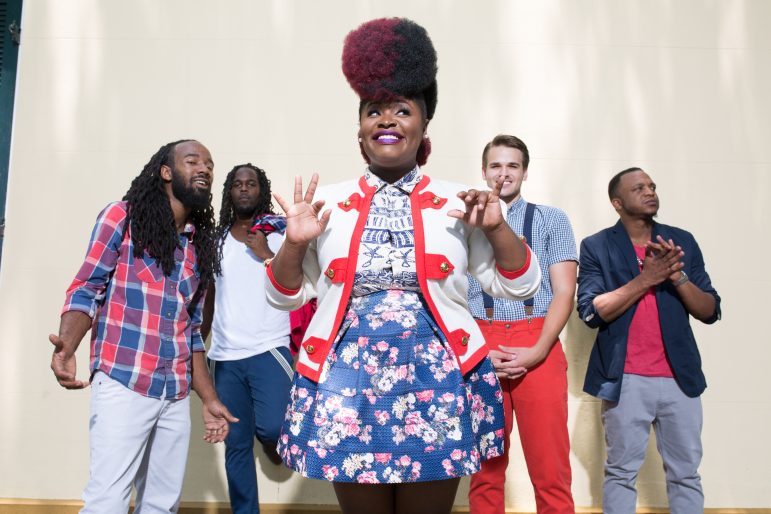The New Orleans-based Tank and the Bangas are the winners of NPR’s Tiny Desk contest this year. They are Tarriona “Tank” Ball, Joshua Johnson, Albert Allenback, Norman Spencer and Merill Beckett. The group is bringing its spirited, high-energy show to Birmingham Saturday. Members Ball, Johnson and Allenback spoke recently with WBHM’s Esther Ciammachilli about how winning the Tiny Desk contest has changed their lives.
Johnson: It’s given us a chance to see how far we can go and how much farther we need to go. It’s been very eye-opening, that’s for sure.
Ball: We’ve always been traveling on tour a lot. You know, we’ll go for three days a week here. The longest time we ever left was literally living in London for three months. But, as far as city to city to city changing constantly flights and constantly taking off my shoes at the airport, oh, it’s given me a little, literally a little taste of what’s to come. And that is both exciting and tiring.
Allenback: If I hear Tank complain about taking her shoes off at the airport one more time I will steal all her shoes. So she has nothing to take off ever again.
Ciammachilli: I want to talk about some of your musical influences.
Allenback: This is Albert. Tank pointed at me to answer for myself, so I’ll answer. So my influence, a huge influence is saxophonist Dexter Gordon Kanye West and The Roots.
Ball: I love “Sesame Street,” “Arthur,” all the Disney soundtracks, “Mulan,” “The Lion King,” Donny Hathaway, Stevie Wonder. You know, everything that was a part of my my growing up, my childhood to my teenage years to my adult time.
Ciammachilli: And how do these influences influence the music that you play today?
Ball: Well, Disney soundtracks because they always made you feel so many feelings all the time. Happy. They always had such an amazing ending to make you feel like, you know life will be pretty OK in the ending, you know? And just remind you of a time when things were just, I don’t know, much more simpler in your life. And it truly was all about the magic. That’s why I love to incorporate magic and special feelings in my music today.
Ciammachilli: And Joshua you, you are the musical director of the band. What does the musical director of Tank and the Bangas do?
Johnson: I get to have fun with everyone’s ideas and a lot of my own as well. Like they said a lot of their influences are a lot of my own. I also listen to like a lot of soundtracks from 1980s on. I like to listen to musicals and to pop and Michael Jackson. I listen to everything weird. All of those things kind of play a part in listening to Tank outside of what she says because what she says may not be exactly what she hears.
Ball: No one understands me.
Ciammachilli: No one understands you?
Ball: No one gets me.
Johnson: This is, it’s a very hard process. You know?
Allenback: Tank likes to make mouth noises and try to tell you what she wants in in a song.
Johnson: I’m like alright.
Ball: Oh and I can’t stand it and I’ll do all that and Albert will still say can you make it a little more clear for me. What do you mean?
Johnson: Yeah.
Ciammachilli: How would you describe your music if you could describe it in one word? Because this is how I describe your music, in one word: mosaic.
Johnson, Ball, Allenback: Oh wow.
Johnson, Ball, Allenback: It is. It is.
Ciammachilli: You know I look at it like, up close there are so there are so many pieces. Like if you get really close to a mosaic you see all these little pieces in there and with your music I hear spoken word poetry. I hear jazz. I hear funk, hip hop, rock, reggae. I hear all these little bits and then when I pull back and I listen to it as a whole you get Tank and the Bangas. Do you think that’s accurate?
Allenback: That is so good. That’s so good.
Johnson: I’ve never heard that. I, I really appreciate that.
Ball: We’ve never ever had one. That is really beautiful. Thank you, Esther.
Ciammachilli: You’re welcome. Thank you.
Allenback: I’m gonna tell all the reporters that.
Johnson: I am running to tell every reporters that.
Ball: And when they say, “Describe your music,” because they always do. “It’s mosaic.”
Allenback: Mosaic.
Johnson: Mosaic. I’m going to do the eyes with it.
Ciammachilli: Do the eyes?
Ball: Our eyes are gonna get really big.
Ball, Johnson, Allenback: (In unison) Mosaic.
Ciammachilli: Nice. Nice. Thank you. Yes. And you make a lot of references to food in your music. So, like “Eggs Over Easy” and then the lyrics in “Boxes and Squares.”
Ball: Well I am a chubby girl. You know I’ve been this way for a long time and I’ve known food to be comforting, good for you and bad for you depending on, you know, what you eat and how you intaking it. And I see people in the same light and situations as well that you put yourself into. And definitely not done on purpose, but it just had its way of coming inside of my music, you know? And that’s the only way I can describe why it does because of my relationship with food has been like my relationship with people.

